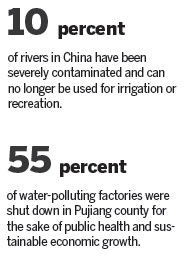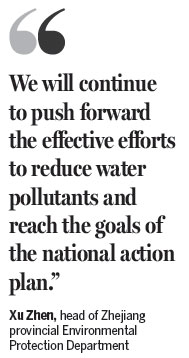Greener villages
Chai Tingxia, a 55-year-old resident of Qixi township, Jiande city, started fish farming in the Lianhuahu Reservoir in 1998, with an annual output of more than 5,000 kilograms.
In 2008, she built more farmhouses to cater to the flood of tourists from urban areas. The output from fish farming and providing tourist accommodations now brings her more than 200,000 yuan annually.
When she became the first one to clean up all the fish net boxes in 2013, the other 25 fish farmers followed suit. The large-scale pond farming had seriously polluted the reservoir, which is the source of the Qiantang River, the mother river of Zhejiang province.
The time has come to reduce fish feeding in order to reduce the eutrophication - the creation of an algal bloom on the surface of the reservoir - said Wu Genliang, head of Qixi township.
The township government has issued preferential policies to encourage the 26 fish farmers to join the tourism industry and abandon casting feed into the water in favor of letting the fish grow in clear water without artificial feeding. Older villagers were given other jobs in the township to guarantee their incomes.
In Jiande, farming is the mainstay of the economy, especially chicken farming. Eggs produced in Jiande account for one-third of the total produced in the province.
In Lianhua township, the waste from the farms was around 400 metric tons a year, the equivalent of the daily waste from a city with a population of 800,000.
Tight controls have been placed on farms raising chickens, cows and hogs to reduce land and water pollution. Around 2,500 farms in the new farming-restriction zones have been closed.
Jiande has built modern facilities to process the waste into energy or other nonpolluting resources, and it reached a utilization rate of 97 percent last year.
The high utilization rate of farm waste is also required in the newly released water pollution control action plan, which stipulated that by 2016, the new and reconstructed farms should be equipped with central processing facilities.
Increasing efforts
Excessive emissions from industrial and agricultural production and households have decreased the water quality in China. Around 10 percent of rivers have been severely contaminated and can no longer be used for irrigation or recreation, according to the latest statistics from the Ministry of Environmental Protection.
In response, the central government released the Action Plan for Prevention and Control of Water Pollution on April 16. Under the plan, water quality nationwide will be dramatically improved and heavily polluted water reduced to less than 10 percent of the total amount of water by 2020.
Zhejiang has led the way in improving water quality and controlling water pollution through the efforts of the past two years, said Xu, the environmental official.
Last year, about 4,660 kilometers of black, foul-smelling rivers had been cleaned up, and surface river water with better than Level 3 quality accounted for 63.8 percent of the total, 2.7 percentage points up from 2010, the department said.
That is a good level in the eastern coastal region with its advanced industrial production and stronger economy, according to the department.
Last year, the province invested more than 80 billion yuan in water pollution control campaigns, and that will be increased to 140 billion yuan by 2017.
Xu, speaking at the Trans-Century Tour of Chinese Environmental Protection, an interviewing event organized by the Environment and Resources Committee of the National People's Congress in late April, said, "We will continue to push forward the effective efforts to reduce water pollutants and reach the goals of the national action plan."
Contact the writer at zhengjinran@chinadaily.com.cn


